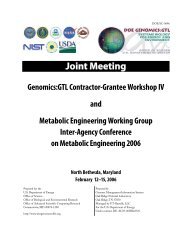2005 gtl abstracts.indb - Genomics - U.S. Department of Energy
2005 gtl abstracts.indb - Genomics - U.S. Department of Energy
2005 gtl abstracts.indb - Genomics - U.S. Department of Energy
You also want an ePaper? Increase the reach of your titles
YUMPU automatically turns print PDFs into web optimized ePapers that Google loves.
Welcome to <strong>Genomics</strong>:GTL Workshop III<br />
Welcome to the third <strong>Genomics</strong>:GTL Contractor-Grantee workshop. GTL continues to grow—scientifically,<br />
in DOE relevance, and as a program that needs all your diverse scientific, technical, and<br />
intellectual efforts to make it a success. GTL is attracting broad and enthusiastic interest and support from<br />
scientists at universities, national laboratories, and industry; colleagues at other federal agencies; <strong>Department</strong><br />
<strong>of</strong> <strong>Energy</strong> leadership; and Congress.<br />
GTL’s challenge to the scientific community is to further develop and use a broad array <strong>of</strong> innovative technologies<br />
and computational tools to systematically leverage the knowledge and capabilities brought to us by<br />
DNA sequencing projects. The goal is to seek a broad and predictive understanding <strong>of</strong> the functioning and<br />
control <strong>of</strong> complex systems in individual microbes and microbial communities. GTL’s prominent position<br />
at the interface <strong>of</strong> the physical, computational, and biological sciences is both a strength and a challenge.<br />
Microbes remain GTL’s principal biological focus. In the complex “simplicity” <strong>of</strong> microbes, we find capabilities<br />
needed by DOE and the nation for clean and secure energy, cleanup <strong>of</strong> environmental contamination,<br />
and sequestration <strong>of</strong> atmospheric carbon dioxide that contributes to global warming. An ongoing<br />
challenge for the entire GTL community is to demonstrate that the fundamental science conducted in<br />
each <strong>of</strong> your research projects brings us a step closer to biology-based solutions for these important national<br />
energy and environmental needs.<br />
This year brings two important milestones for GTL. First is the development <strong>of</strong> a roadmap that will help<br />
guide and justify the GTL program to a broad audience <strong>of</strong> scientists, policymakers, and the public. In the<br />
coming weeks we will be calling on many <strong>of</strong> you to provide critical review <strong>of</strong> this important document.<br />
Second is an important step forward in developing GTL user facilities: we are beginning the process <strong>of</strong><br />
engineering and designing the Facility for Production and Characterization <strong>of</strong> Proteins and Molecular<br />
Tags.<br />
GTL workshops are high-energy events that provide an opportunity for all <strong>of</strong> us to discuss, listen, and<br />
learn about exciting new advances in science; identify research needs and opportunities; form research<br />
partnerships; and share the excitement <strong>of</strong> this program with the broader scientific community. We look<br />
forward to a stimulating and productive meeting and <strong>of</strong>fer our sincere thanks to all the organizers and to<br />
you, the scientists, whose vision and efforts will help us all to realize the promise <strong>of</strong> this exciting venture.<br />
Ari Patrinos<br />
Associate Director <strong>of</strong> Science for<br />
Biological and Environmental Research<br />
Office <strong>of</strong> Science<br />
U.S. <strong>Department</strong> <strong>of</strong> <strong>Energy</strong><br />
ari.patrinos@science.doe.gov<br />
Ed Oliver<br />
Associate Director <strong>of</strong> Science for<br />
Advanced Scientific Computing Research<br />
Office <strong>of</strong> Science<br />
U.S. <strong>Department</strong> <strong>of</strong> <strong>Energy</strong><br />
ed.oliver@science.doe.gov





